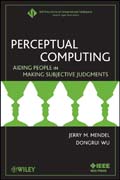
Perceptual computing: aiding people in making subjective judgments
Mendel, Jerry
Wu, Dongrui
Lotfi Zadeh, the father of fuzzy logic, coined the phrase computing with words (CWW) to mean a methodology in which the objects of computation are words and propositions drawn from a natural language. This book explains how to implement CWW for making subjective judgments, which we call Perceptual Computing. It does this by focusing on the three components of a Perceptual Computer (encoder, CWW engines, and decoder) and then providing detailed applications for it. For every application, one begins by creating a user-friendly vocabulary. The Perceptual Computers Encoder obtains a mathematical model for each word in the vocabulary. The words and their models constitute the codebook for the application. There can be different kinds of CWW engines, including IF-THEN rules,novel weighted-averages, and linguistic summarizations. They can all be viewed as ways to transform (map) their input-word mathematical models into output mathematical models, and in all cases these transformations are very non-linear. Finally, the output mathematical models are mapped into a recommendation (subjective judgment) by the Decoder which may be in the form of a word, rank orclass. One of the novel features of this book is that because some readers will be more interested in the application chapters (Chapters 7-10) rather than in the detail chapters (Chapters 2-6), we provide a summary for each detail chapter that provides the applications-oriented reader with what might be calleda superficial understanding of the main points of the chapter. Although superficial, after reading these five summaries, it should be possible to read Chapters 7-10.Jerry M. Mendel is Professor of Electrical Engineering at the University of Southern California. A Life Fellow of the IEEE and a Distinguished Member of the IEEE Control Systems Society, Mendel began his career at McDonnell Douglas before joining USC in 1974. He is the recipient of many awards for his diverse research, including the IEEE Centennial Medal, the Fuzzy Systems Pioneer Awardfrom the IEEE Computational Intelligence Society, and the IEEE Third Millenium Medal. His research centers on Type 2 Fuzzy Logic and smart oil field technology. Dongrui Wu received a B.E in Automatic Control from the University of Science and Technology of China, Hefei, Anhui, P.R. China, in 2003, and an M.Engin Electrical Engineering from the National University of Singapore, Singapore, in 2005. Currently he is pursuing his Ph.D. in Electrical Engineering at the University of Southern California, Los Angeles, CA. His research interests include control theories, computational intelligence, machine learning, signal processing, and their applications to smart oilfield technologies. He receiveda Best Student Paper Award from the IEEE International Conference on Fuzzy Systems, Reno, Nevada, 2005. Dongrui Wu is a student member of IEEE and SPE, anda member of Eta Kappa Nu.
- ISBN: 978-0-470-47876-9
- Editorial: John Wiley & Sons
- Encuadernacion: Rústica
- Páginas: 336
- Fecha Publicación: 07/05/2010
- Nº Volúmenes: 1
- Idioma: Inglés
